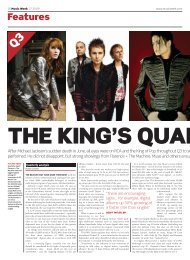Remake, Remodel: The Evolution Of The Record Label
Remake, Remodel: The Evolution Of The Record Label
Remake, Remodel: The Evolution Of The Record Label
Create successful ePaper yourself
Turn your PDF publications into a flip-book with our unique Google optimized e-Paper software.
This pre-draft version is strictly for review purposes only and is not for general dissemination or sharing.<br />
Both of these areas depend on careful management and specialist skill to avoid costly<br />
pitfalls.<br />
As David Joseph says, ‘D2C is something you have to be real experts in. We are very<br />
quietly doing it and I’m making sure we are being incredibly responsible in what we’re<br />
doing, providing proper customer care and the best service. We are building a business<br />
very nicely and have been for a couple of years. You have to look at it from the music fan<br />
and the customer experience point of view – you need to have quality stock and delivery<br />
around it. <strong>The</strong>re has to be a totally great experience.’<br />
A key part of D2C is enabling e-commerce on artist websites. Fans need to be able to go<br />
to an artist’s site and buy everything there. Some products may be sold direct, some may<br />
be through affiliate sales (via Amazon, for example), but ideally the transaction should<br />
appear to the consumer as being through one site and in one basket.<br />
Brian Message summarises D2C as monetising the artist/fan relationship. He feels that<br />
record labels are held back by being traditionally reliant and skilled in a consumer<br />
product model.<br />
‘You are in a relationship game and that is so different to the consumer product game,’<br />
he suggests. ‘It’s a massive difference.’<br />
He believes that artists and management have a lot to offer in this space and that labels<br />
should form partnerships with acts to really drive D2C. He cites the McFly initiative as a<br />
great example of how to work relationships with fans. ‘Why did McFly only offer 10,000<br />
pioneers on their online fan club?’ he asks. ‘Because for all the ones that didn’t get<br />
pioneer status, you need them to be jealous. It’s a badge of honour. You’re playing the<br />
relationship game.’<br />
A resilient organism<br />
Clearly the diversification of labels into a new kind of business – which Howard Jones<br />
describes as moving from ‘high risk/high return, to high risk/high returns (plural), as<br />
they increase the areas they are making money from is dependent on the development<br />
or importation of appropriate skills and experience.<br />
Alison Wenham of AIM cites a recent survey that suggests that only 20 per cent of the<br />
organisation’s member labels have recorded music as their primary source of<br />
income and more members than ever state that their primary source of business is<br />
‘another music-related business’ 31 .<br />
<strong>The</strong> sheer range of activities outside of recorded music that are pursued by labels, big<br />
and small seems to underline that for most players, diversification is the key to survival.<br />
Contents<br />
31 An AIM survey showed that 22% of AIM members stated their label is their primary source of income in<br />
the most recent survey. 29% state their primary source of income is another music related business that<br />
they own - AIM Annual Membership Survey, 2010, Aug 2010<br />
40



